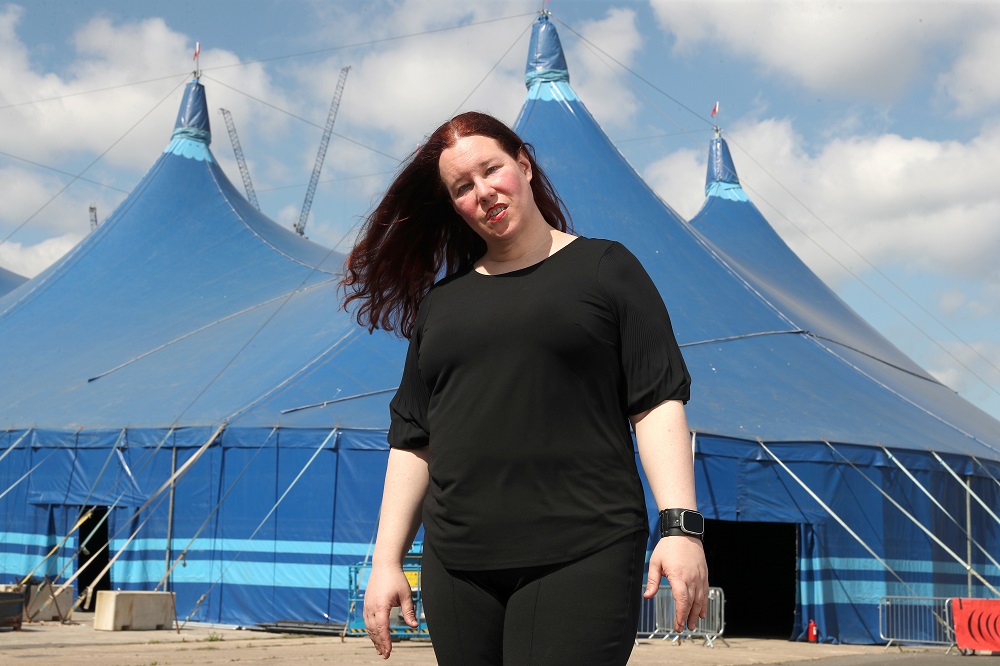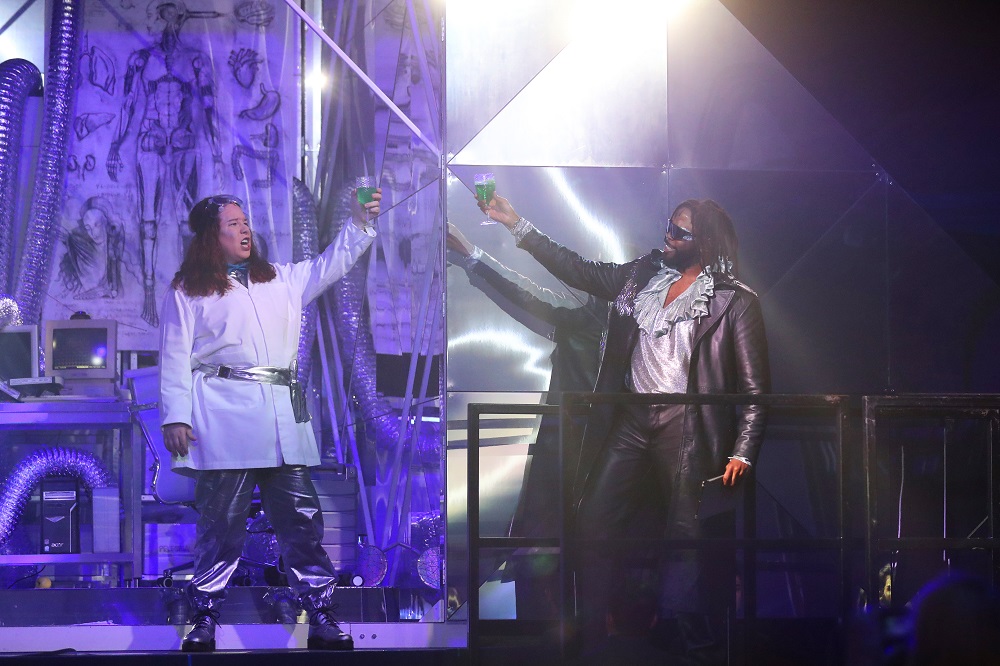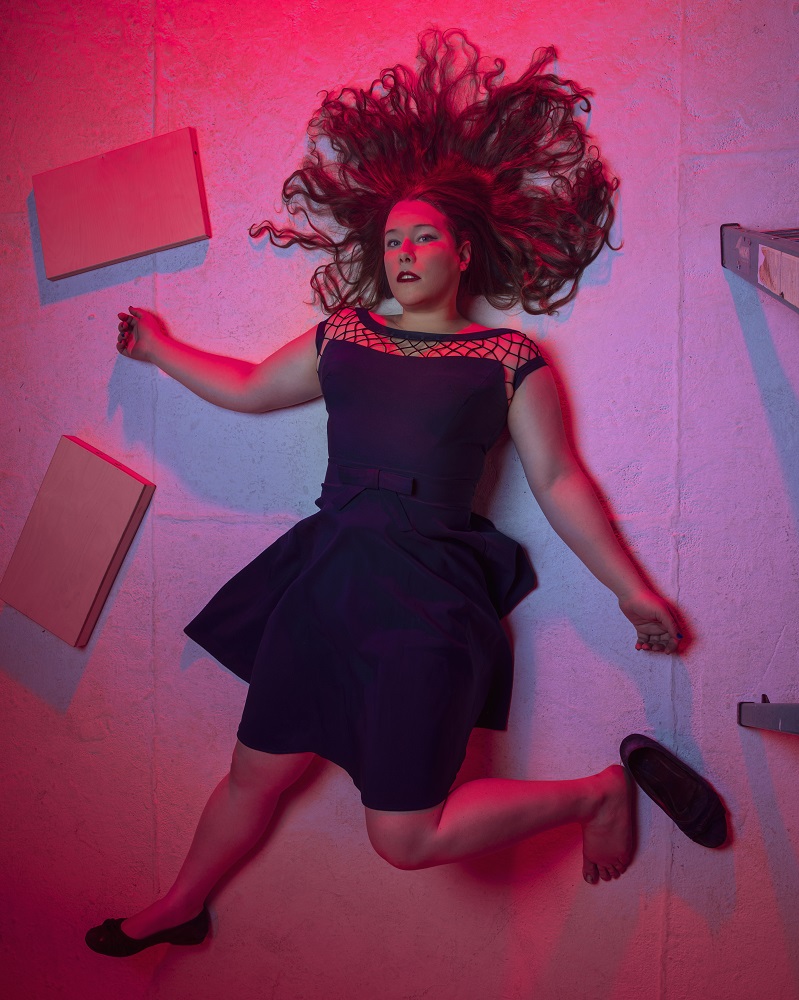Trans opera singer Lucia Lucas on Tippett’s “New Year” and her life in music

There are parts that needed updating. Parts of the libretto seemed insensitive from our perspective in 2024. You can’t sugarcoat everything and take the drama out of the story, but it was important to update it with the blessing of Tippett’s estate.
At the beginning, everyone was just trying to get it right, but it was fun to see the variations in rehearsals and between performances. As time went on, our conductor Alpesh Chauhan started taking more risks and really playing with the soundscape, which was exciting. It felt like he was directing the orchestra and had complete control. (Pictured below: Lucas as Merlin and Joshua as Pelegrin) Because the audience is mobile, they were in a different position every night. Sometimes I had to weave in and out more and people didn’t know I was right behind them. The Dream Tent is actually not the wildest place I’ve ever played. I’ve sung in a bombed-out restored church and at Fringe festivals where they said, “Here’s your corner.” It doesn’t really faze me as long as I’m mindful of obstacles like uneven ground. We found that the cube I spend half the show in can get very slippery when it rains, so we had to be careful of that.
Because the audience is mobile, they were in a different position every night. Sometimes I had to weave in and out more and people didn’t know I was right behind them. The Dream Tent is actually not the wildest place I’ve ever played. I’ve sung in a bombed-out restored church and at Fringe festivals where they said, “Here’s your corner.” It doesn’t really faze me as long as I’m mindful of obstacles like uneven ground. We found that the cube I spend half the show in can get very slippery when it rains, so we had to be careful of that.
Now that the run is over, I am so grateful that it was successful and that we had such a supportive audience every night. I love that Alpesh and Keith (Warner, the excellent director who picks up where the late, great Graham Vick left off) have been able to revive such a complex piece with absolutely gorgeous music. I loved my time in Birmingham and the friendships I made with the people in the cast will last a lifetime. Thank you to everyone involved in the production, especially the Birmingham actors and singers who give so generously to this wonderful endeavour.
I love how accessible the Birmingham Opera Company’s shows are, that people come who wouldn’t normally. If we want this art form to survive and thrive, we need to welcome everyone who comes to the theatre. You don’t have to wear a ball gown or a suit. Just come, that’s the most important thing.(Pictured below: Lucas as Merlin).  Telling a variety of stories, both familiar and new, is an important part of attracting new people. If there’s a community that sees their story represented on stage, they might be more likely to come. Then they’ll say, “Oh, that’s opera! I thought opera was something else,” and then they might look for something else.
Telling a variety of stories, both familiar and new, is an important part of attracting new people. If there’s a community that sees their story represented on stage, they might be more likely to come. Then they’ll say, “Oh, that’s opera! I thought opera was something else,” and then they might look for something else.
Opera is about spectacle to some extent, but for me it’s about finding the emotional core of a story and being as honest as possible. That can touch people even if they don’t consider themselves an opera fan.
If I’m performing traditional repertoire and no one looks at their program and sees my name and doesn’t realize I’m trans, it doesn’t bother me. Advocacy is important, but it doesn’t have to be onstage. In fact, it’s better offstage. The jobs I’ve had that have been easiest are the ones where we’re just making art that’s not about gender. If it’s just gender-swapping a character, that can work, rather than trying to force something in about transition. But if I’m playing a character who’s misunderstood, I feel like my background can definitely help me. That can be really powerful.
Last year I had the premiere of the opera Lili Elbe in St. Gallen, Switzerland, about the Danish painter who was one of the first people to undergo sex reassignment surgery in 1930. I had been working on it for five years with Tobias Picker and the librettist Aryeh Lev Stollman. We talked for hours while I told them everything about myself and the sex reassignment.
With Sylvia D’Eramo in a scene from Lili Elbe about OperaVISion on YouTube
Playing Lili was a very personal thing for me. I had many of her experiences with my wife, the contralto Ariana Lucas, and we went through them too. One time Aryeh called me and said: “I need something for this scene so that the mother or the sister can show their disapproval.” I was reminded of how one of my colleagues at the opera in Karlsruhe, when he saw me for the first time since I came out, said: “I don’t like that.” In the face of that, there is no discussion, that’s the end of the matter. That’s pretty tough.
When I came out, I had to prove myself to different doctors over and over again because of the rules of gender reassignment. But when you’re confident, coming out is easier. I’ve tried for years to be what other people wanted me to be, but the longer it goes on, the easier it is for me to say, “No, I’ve already figured that out, you have no say in the matter.”
I can’t say that companies were immediately open to my coming out. Even my own company said, “Has anyone done this before? How does it work? We hired you as a baritone.” There were no openly transgender opera singers performing.
 If my voice had changed and I couldn’t sing after the transformation, that would be fine. But my voice hasn’t changed and I’ve continued to play my roles the same way I did before. Maybe the makeup and costume designers need a little longer, but for me it’s not a big deal to do my job. (Lucas Picture right by Josh New).
If my voice had changed and I couldn’t sing after the transformation, that would be fine. But my voice hasn’t changed and I’ve continued to play my roles the same way I did before. Maybe the makeup and costume designers need a little longer, but for me it’s not a big deal to do my job. (Lucas Picture right by Josh New).
When I came out to my mom, a feminist, she said, “Are you sure you want to make 70 cents on the dollar?” I couldn’t have predicted that reaction at the time, but looking back, it’s kind of funny that her first reaction had to do with money.
When I came out in 2014, the political mood and general acceptance in the world was more hopeful. Then Trump was elected and Brexit happened and things spiraled out of control. In the last two years, LGBT people, and especially trans people, have become the pawns of politics. You can talk about a gender debate, but we are not debating gender, we are debating people’s lives and whether they can exist.
There are countries I don’t travel to, but it’s kind of crazy to see countries I travel to all the time being so violent in their rhetoric about one percent of the population. To all the people who are suffering, who are victims of austerity, do you really think I’m your problem? I have nothing to do with your economic situation. I can also assure you that any trans person in a bathroom or changing room is doing their best to get out of everyone’s way and be overly respectful because we don’t want to cause a problem.
I hope to make things easier for trans people by being open and accessible via email. Some of my former opera teachers now have trans students and talk to me. People in the US and Europe have reached out to me. I want to show them the right path and be a source of information.


:max_bytes(150000):strip_icc():focal(756x244:758x246)/Harry-Potter-and-the-Philosophers-Stone-Book-Illustration-Cover-062724-156529177e224a03a447786a264ff1d5.jpg)
